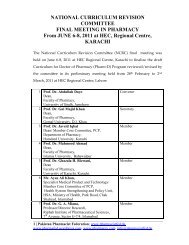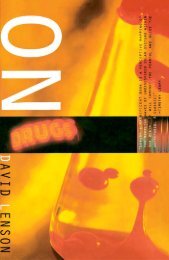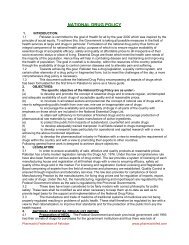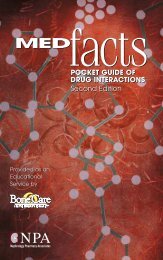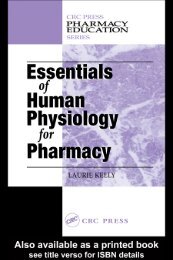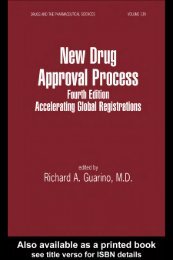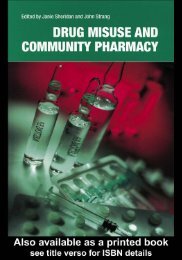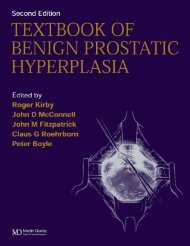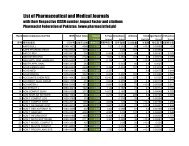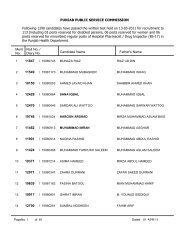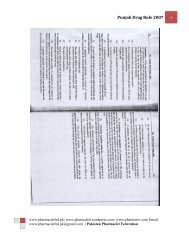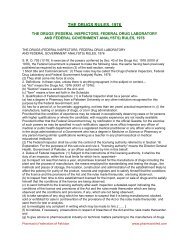THE DRUGS ACT 1976 Chapter 3
THE DRUGS ACT 1976 Chapter 3
THE DRUGS ACT 1976 Chapter 3
You also want an ePaper? Increase the reach of your titles
YUMPU automatically turns print PDFs into web optimized ePapers that Google loves.
<strong>THE</strong> <strong>DRUGS</strong> <strong>ACT</strong><br />
(XXXI OF <strong>1976</strong>)<br />
[llth May, <strong>1976</strong>]<br />
An Act to regulate the import, export, manufacture, storage, distribution and sale of drugs<br />
Preamble : Whereas it is expedient to regulate the import, export, manufacture, storage, distribution and<br />
sale of drugs:<br />
It is hereby enacted as follows:--<br />
CHAPTER III<br />
Prohibitions<br />
23. Import, manufacture and sale of drug: (1) No person shall himself or by any other person on his<br />
behalf--<br />
(a) export, import or manufacture for sale or sell ·<br />
(i) any spurious drug;<br />
(ii) any counterfeit drug;<br />
(iii) any misbranded drug;<br />
(iv) any adulterated drug;<br />
(v) any substandard drug;<br />
(vi) any drug after its expiry date;<br />
(vii) any drug which is not registered or is not in<br />
accordance with the conditions of registration;<br />
(viii) any drug which, by means of any statement, design or device accompanying it or by any other<br />
means, purports or claims to cure or mitigate .any such disease or ailment, or to have any such other<br />
effect, as may be prescribed;<br />
(ix) any drug if it is dangerous to health when used in the dosage or with the frequency, or, for the<br />
duration specified, recommended or suggested in the labelling thereof; or<br />
(x) any drug in contravention of any of the provisions of this Act or any rule;<br />
(b) manufacture for sale any drug except under, and in accordance with the conditions of, a licence<br />
issued under this Act;<br />
(c) sell any drug except under, and in accordance with the conditions of, a licence issued under this Act;<br />
<strong>THE</strong> <strong>DRUGS</strong> <strong>ACT</strong> (XXXI OF <strong>1976</strong>) [llth May, <strong>1976</strong>] An Act to regulate the import, export, manufacture,<br />
storage, distribution and sale of drugs Preamble : Whereas it is expedient to regulate the import, export,<br />
manufacture, storage, distribution and sale of drugs: It is hereby enacted as follows:-- CHAPTER III<br />
Prohibitions 23. Import, manufacture and sale of drug: (1) No person shall himself or by any other person<br />
on his behalf-- (a) export, import or manufacture for sale or sell · (i) any spurious drug; (ii) any counterfeit<br />
drug; (iii) any misbranded drug; (iv) any adulterated drug; (v) any substandard drug; (vi) any drug after its<br />
expiry date; (vii) any drug which is not registered or is not in accordance with the conditions of<br />
registration; (viii) any drug which, by means of any statement, design or device accompanying it or by any<br />
other means, purports or claims to cure or mitigate .any such disease or ailment, or to have any such<br />
other effect, as may be prescribed; (ix) any drug if it is dangerous to health when used in the dosage or<br />
with the frequency, or, for the duration specified, recommended or suggested in the labelling thereof; or<br />
(x) any drug in contravention of any of the provisions of this Act or any rule; (b) manufacture for sale any<br />
drug except under, and in accordance with the conditions of, a licence issued under this Act; (c) sell any<br />
drug except under, and in accordance with the conditions of, a licence issued under this Act; (d) import or<br />
export any drug the import or export of which is prohibited by or under this Act; (e) import or export any<br />
drug for the import or export of which a licence is required, except under, and in accordance with the<br />
conditions of, such licence; (f) supply an incorrect, incomplete or misleading information, when required to<br />
furnish any information under this Act or the rules; (g) peddle, hawk or offer for sale any drug in a park or<br />
public street or on a highway, footpath or public transport or conveyance; (h) import, manufacture for sale,<br />
or sell any substance, or mixture of substances, which is not a drug but is presented in a form or a<br />
manner which is intended or likely to cause the public to believe it to be a drug; (i) sell any drug without<br />
Pharmacist Federation of Pakistan<br />
www.pharmacistfed.com
having a warranty in the prescribed form bearing the name and batch number of the drug issued,-- (i) in<br />
the case of a drug manufactured in Pakistan, by the manufacturer holding a valid licence to manufacture<br />
drugs and permission to manufacture that drug or by his authorised agent; (ii) in the case of an imported<br />
drug, by the manufacturer or importer of that drug or, if the drug is imported through an indentor by such<br />
indentor; and (j) apply an incorrect batch number to a drug. (2) Nothing in sub-section (1) shall apply to<br />
the manufacture or subject to prescribed conditions, of small quantities or any drug for the purpose of<br />
clinical trial examination, test, analysis or personal use. COMMENTS Scope: Where drugs are stocked in<br />
a shop the presumption is that they have been stocked for sale. Distributing includes dispensing and the<br />
Mens rea is not necessary for conviction of the accused. It is not necessary that the accused should have<br />
known that it was an offence to stock drugs for sale without licence. P L D 1957 Kar. 671. The charge<br />
against the accused was under section 18(b) of the Drugs Act and therefore an essential ingredient of the<br />
evidence was that the drugs sold by the accused were drugs which has been manufactured by an<br />
unlicensed manufacturer. And it was in order to prove this ingredient of the offence that the Inspector of<br />
P.W. had produced the letter of the Health Department, that the alleged manufacturers did not have any<br />
licence to manufacture drugs. But the burden was on the prosecution to prove that the manufacturers did<br />
not have any licence under the Drugs Act and as the accused had taken objection to the production of<br />
this letter the prosecution should have prove it in the manner prescribed under Section 67 of the Evidence<br />
Act. This it did not care to do. It was contended that the letter had not been proved : Held :This<br />
submission was supported by the unanimous view of the Supreme Court in the case of Muhammad<br />
Khattak v. S.M. Ayub,1974 P Or, L J Note 81. Additionally there was also no provision in the Drugs Act<br />
which could relieve the prosecution of its obligation to prove this letter under section 67 of the Evidence<br />
Act, held the letter had not been proved. The substandard drug for the manufacture of which the<br />
respondent herein was sought to be prosecuted was actually manufactured by Laboratories which being<br />
a private Limited Company, incorporated under the Companies Act, 1913, would be a 'person' in its own<br />
right within the meaning of that expression as appearing in section 18, section 19(3) and section 27, Drug<br />
Act, 1940. By the plain language of the said three sections, therefore, prima facie Messrs. Laboratories<br />
seemed to have brought itself within the mischief of the law. Therefore if the prosecution had proceeded<br />
against the said Company, in view of the bar contained in section 19, it would not be open to it to plead in<br />
defence that it was ignorant of the nature, substance or quality of the said substandard drug or of the<br />
circumstances in which it was manufactured. In point of fact under section 19(3), its liability would seem to<br />
be total. And consequently upon its conviction it could under section 27 be awarded the punishment of<br />
fine. The difficulty in the way of the appellants, however, is that no proceedings were drawn up against<br />
the said Company. Nor indeed the Company was made a co-accused in the challan submitted against the<br />
respondent, herein in the criminal Court. In so far as the liability of the respondent is concerned, it would<br />
not only arise if he can be shown to have manufactured the said substandard drugs for and on behalf of<br />
Messrs. Nawabsons Laboratories Limited, as in the nature of things the said Company had to act through<br />
a living person. It was true that at the relevant time respondent was the Managing Director of the said<br />
Company. But then in the challan submitted against him in the trial Court no allegation was made that it<br />
was he who had manufactured the said drug on behalf of the said company. Furthermore, it is common<br />
knowledge that in the hierarchy of a Limited Company, the Managing Director was assisted by other<br />
directors as well as executives, officers and workers. There was no reason to believe that in the case of<br />
Laboratories the system was any different. Therefore, it would be difficult .to presume that the respondent<br />
was guilty of the manufacture of the said substandard drug for and on behalf of the Company, just<br />
because he happened to be its Managing Director. P L D 1978 S C 193; N L R 1978 S C 768; P L J 1978<br />
S C 283. Omission by the prosecution to bring on record expert's opinion in proof of the allegation that<br />
drug allegedly recovered from accused's premises was spurious and such omission entitles the accused<br />
to a clean acquittal even at the preliminary stage. Drug Court accepted accused's application under<br />
section 249-A, Cr.P.C. on additional grounds that complaint was incompetently lodged and recovery was<br />
in contravention of section 103, Cr.P.C. N L R 1985 Or. L J 266. Prosecution on the basis of complaint of<br />
'the Drug Inspector who is not duly notified under Section 17, cannot be sustained in a case where<br />
recovery was not witnessed according to section 103, Cr.P.C. The Drug Court accepted accused's<br />
application and ordered their acquittal. N L R 1985 U C 386 (2), Where a dealer in medicines purchased<br />
drugs from a manufacturer and obtained a warranty that there had been no contravention of this section<br />
from the manufacturer and sent a copy of warranty with written notice to Inspector of Drugs and warrantor<br />
within 7 days of the service of .summons upon him, it was held that in such circumstances the dealer<br />
could not be held guilty. 1973 P Cr. L J 218. The word "building" in Schedule B, para. 2 of the Drugs<br />
Pharmacist Federation of Pakistan<br />
www.pharmacistfed.com
(Licensing, Registering and Advertising) Rules is synonymous with the word "premises". The word<br />
"premises" as used in various rules and the Schedule does not mean a detached or separate building or<br />
structure. Mere use of a portion of premises or building for residential purposes does not render it<br />
unsuitable for a licensed premises and manufacturing place is only required to be separate from the<br />
residential place. P L D 1978 Lah. 445. Where the applicant committed a breach of the provisions of this<br />
section and also of rule, a charge can be framed even if the complaint does not expressly state the<br />
provision of law which has been contravened. 1955 All. W.R. (HC) 328. For committing an offence under<br />
this section, intention to do the guilty act which is made penal by the statute is not required. The Act<br />
creates an absolute liability and rules out mens reaas a constituent part of the crime. It would only affect<br />
the question of punishment. 1958-2 Mad. L Jour. 308. The complaint against the accused for<br />
manufacturing for sale substandard Ampicillin Dry Syrup containing 89% Ampicillin against U.S.P. limits<br />
of 90% to 120% and thus violating provisions of the Drugs Act. The accused, however, explaining carton<br />
of drug containing instructions for its keeping in a cool and dark place and as per WHO pamphlet loss of<br />
activity of international standard if drug stored at temperature less than 20oC and such requirements<br />
having not been fulfilled, there appeared a slight discrepancy in quantum of active agent. Ampicillin<br />
according to B.P. to be in a well closed container at a temperature not exceeding 25oC but climatic<br />
conditions in Pakistan ranging from 30oC to 40oC. Drug after the purchase remaining in normal<br />
temperature and possibility of deficiency in contents as required by B.P. existing. The accused was given<br />
the benefit of doubt and acquitted, in circumstances. 1979 P Cr. L J 872. Offences falling under section<br />
23 of the Drugs Act, being punishable up to 10 years, the prohibition under section 497, Cr.P.C., was<br />
attracted, the offences related to clandestine sale of stolen Government medicines as well as their<br />
genuineness, hence bail is declined. 1981 P Cr. L J 243. Instructions against provisions of Section 23<br />
could not be relied upon. Petitioner has referred to Section 23 of the Drugs Act, <strong>1976</strong> which provide that<br />
any drug of which the expiry period had not expired could be imported. In view of the provision of Section<br />
23 of the Drugs Act, respondent No. 1, could not decline permission to the petitioner company to clear<br />
any drug of which the period of expiry had not been completed as was the present case, therefore, the<br />
reliance on the instructions as against the express provisions of Section 23 of the Act, could not have<br />
been made. 1994 C L C 2270. Self-contradictory order: Acquittal of the accused under section 265-K,<br />
Cr.P.C. with observation tantamounting to punish him while the order is impugned. Petitioner was<br />
acquitted and convicted by one and the same order being self-contradictory, petition was converted into<br />
appeal and impugned observations were expunged. 1987 S C M R 2100. Quashment of F.I.R. :<br />
Registration of the F.I.R. in respect of the offence was not a case classified by the Provincial Quality<br />
Control Board. nor the Provincial Inspector had submitted a report to the said Board Provincial Inspector<br />
had also not obtained instructions from the Provincial Quality Control Board regarding the registration of<br />
the F.I.R. and on his own had got the same registered which act being without lawful authority was<br />
declared to be of no legal effect. Constitutional petition was accepted accordingly. 1994 P Cr. L J 1065.<br />
Quashment of proceedings : Only allegation against the manufacturer being that sample pack of drug<br />
contained 15 mi. of drug and that under R. 32 contents should have been less than 15 mi. No allegation<br />
made to the effect that manufacturer sold physician's sample to any one in contravention of the provisions<br />
of the Act or Rules. Nowhere in the complaint it was urged that quantity impact was unreasonable or that<br />
unreasonably large quantity of sample was supplied to any physician or institution. No fresh case could<br />
be permitted to be argued against the manufacturer in that behalf. Complaint being based on erroneous<br />
view of law no case, held, was made out against the manufacturer for violation of R. 32 which could entail<br />
any punishment under section 27(4) or 23(1)(x), Drug Act, <strong>1976</strong>, therefore, the proceedings were<br />
quashed. P L D 1985 Lah. 503. The accused was proceeded against for manufacturing spurious drugs.<br />
Drug Inspector could not identify accused who was admittedly not present at the premises in question<br />
when raid was conducted. Two persons, apprehended on the spot exonerated accused and denied<br />
having any acquaintance with him or having ever seen him in the premises. Disputed premises was<br />
neither owned by the accused nor occupied by him. Lease agreement showed that premises was rented<br />
out to someone else by the owner and the proceedings were quashed in such circumstances. 1991 P Cr.<br />
L J 2329. Constitutional petition concerned only with import of drugs and their clearance. Applicant<br />
shareholder, desirous to become a party to Constitutional petition in view of disputes inter se between<br />
shareholders of the company. Applicant's locus standi to be impleaded as a party in Constitutional<br />
petition. Clearance of drugs being for the benefit of the company of which applicants were shareholders,<br />
they were, therefore, neither necessary nor proper party in such proceedings. As for applicant's dispute<br />
with other shareholders of the company regarding the affairs of the company, they could seek remedy in<br />
Pharmacist Federation of Pakistan<br />
www.pharmacistfed.com
accordance with law. 1994 C L C 2270(b). Substandard drugs: Record not showing that after purchasing<br />
drugs from manufacturer whether same were stored under the conditions laid down or stated on carton.<br />
Reasonable possibility of sample obtained by the Drug Inspector and subsequently sent to the National<br />
Health Laboratory having been deteriorated due to its improper storage after the purchase from<br />
manufacturers not ruled out. Accused entitled to the benefit of doubt and the conviction and sentence<br />
were set aside. 1985 P Or. L J 281; 1985 P Cr. L J 281. According to the case of Fazal Elahi v. The<br />
State,1985 P Cr. L J 268, no prosecution launched against the company which manufactured drugs in<br />
question. Accused not shown to be acting as agent of the company for distribution of substandard drugs.<br />
In absence of the company, accused held, could not be prosecuted. The liability of manufacturer of the<br />
drugs and his agent for distribution thereof would be co-extensive. Appreciation of Evidence. Evidence on<br />
record did not show that the accused was found selling the drugs recovered from his possession while<br />
keeping them in his shop without a licence. Drugs recovered could be available almost in every house for<br />
daily consumption. Defence version was believable and the possibility of false implication of accused<br />
could not be ruled out. Accused was acquitted in circumstances. 1994 P Cr. L J 2468. Appeal against<br />
acquittal: Explanation given by the accused for not complying with a direction of the Secretary,<br />
Registration Board, to mention "Oleoresin of Ginger" as an ingredient on the label was convincing.<br />
Nothing manifestly wrong or perverse was, therefore, found in the conclusion arrived at by the trial Court,<br />
the appeal against the acquittal of the accused was consequently dismissed. P L D 1992 Kar. 347 (d). 24.<br />
Control of advertisement: No person shall himself or by any other person on his behalf advertise, except<br />
in accordance with such conditions as may be prescribed,-- (i) any drug; (ii) any substance used or<br />
prepared for use in accordance with the ayurvedic, unani, homoeopathic or biochemic system of<br />
treatment or any other substance or mixture of substances as may be prescribed; (iii) any remedy,<br />
treatment or offer of a treatment for any disease. Explanation: In this section, "advertise" means to make<br />
any representation by any means whatsoever for the purpose of promoting directly or indirectly the sale<br />
or disposal of a drug, a substance or a mixture of substances, a remedy or a 'treatment except the display<br />
of sign boards for a clinic, a dispensary or a hospital or such other institution offering treatment.<br />
COMMENTS Presumption of fact : No evidence having been produced by prosecution to prove factum of<br />
publication of advertisement in newspaper and souvenir by the accused. Accused having disputed the<br />
same. Mere fact that advertisement might have benefited the accused, held, would not justify raising of<br />
presumption against the accused under section 114 (f) of the Evidence Act (I of 1872), the appeal Appeal<br />
was, therefore, allowed, conviction and sentence were set aside. 1986 P Cr. L J 486. Handbill displaying<br />
picture of healthy seminude male and female with writing "it is well-known about Knight Pills that husband<br />
who takes Knight Pills never gets old and knight Pills keeps the potency of a male ready for action".<br />
Ingredients of Knight Pills was totally missing from handbill. Language used in the handbill was calculated<br />
to induce persons interested in combating sexual weakness to buy pills mentioned in the handbill, thereby<br />
promoted sale of pills and as such handbill would fall within the definition of "advertisement". 1984 P Cr. L<br />
J 2895. Burden of proof: Prosecution not producing any witness to prove the fact that the accused caused<br />
publication of advertisement in newspaper and pamphlet. Accused disputing publication of such<br />
advertisement to have been caused by him. Burden of proof, would lie squarely on prosecution. 1986 P<br />
Cr. L J 486. 25. Control of samplings: No person shall distribute or cause to be distributed any drug as a<br />
sample except in accordance with such conditions as may be prescribed. 26. Control of printing of<br />
labelling: No person shall print any labelling in respect of any drug which is required to be registered<br />
under this Act but is not so registered after the date fixed by the Federal Government under sub-section<br />
(6) of section 7 or for a person who does not possess a licence under this Act to manufacture that drug.<br />
"><br />
(d) import or export any drug the import or export of which is prohibited by or under this Act;<br />
(e) import or export any drug for the import or export of which a licence is required, except under, and in<br />
accordance with the conditions of, such licence;<br />
(f) supply an incorrect, incomplete or misleading information, when required to furnish any information<br />
under this Act or the rules;<br />
(g) peddle, hawk or offer for sale any drug in a park or public street or on a highway, footpath or public<br />
transport or conveyance;<br />
Pharmacist Federation of Pakistan<br />
www.pharmacistfed.com
(h) import, manufacture for sale, or sell any substance, or mixture of substances, which is not a drug but<br />
is presented in a form or a manner which is intended or likely to cause the public to believe it to be a drug;<br />
(i) sell any drug without having a warranty in the prescribed form bearing the name and batch number of<br />
the drug issued,--<br />
(i) in the case of a drug manufactured in Pakistan, by the manufacturer holding a valid licence to<br />
manufacture drugs and permission to manufacture that drug or by his authorised agent;<br />
(ii) in the case of an imported drug, by the manufacturer or importer of that drug or, if the drug is imported<br />
through an indentor by such indentor; and<br />
(j) apply an incorrect batch number to a drug.<br />
(2) Nothing in sub-section (1) shall apply to the manufacture or subject to prescribed conditions, of small<br />
quantities or any drug for the purpose of clinical trial examination, test, analysis or personal use.<br />
COMMENTS<br />
Scope: Where drugs are stocked in a shop the presumption is that they have been stocked for sale.<br />
Distributing includes dispensing and the Mens rea is not necessary for conviction of the accused. It is not<br />
necessary that the accused should have known that it was an offence to stock drugs for sale without<br />
licence. P L D 1957 Kar. 671.<br />
The charge against the accused was under section 18(b) of the Drugs Act and therefore an essential<br />
ingredient of the evidence was that the drugs sold by the accused were drugs which has been<br />
manufactured by an unlicensed manufacturer. And it was in order to prove this ingredient of the offence<br />
that the Inspector of P.W. had produced the letter of the Health Department, that the alleged<br />
manufacturers did not have any licence to manufacture drugs. But the burden was on the prosecution to<br />
prove that the manufacturers did not have any licence under the Drugs Act and as the accused had taken<br />
objection to the production of this letter the prosecution should have prove it in the manner prescribed<br />
under Section 67 of the Evidence Act. This it did not care to do. It was contended that the letter had not<br />
been proved : Held :This submission was supported by the unanimous view of the Supreme Court in the<br />
case of Muhammad Khattak v. S.M. Ayub,1974 P Or, L J Note 81. Additionally there was also no<br />
provision in the Drugs Act which could relieve the prosecution of its obligation to prove this letter under<br />
section 67 of the Evidence Act, held the letter had not been proved.<br />
The substandard drug for the manufacture of which the respondent herein was sought to be prosecuted<br />
was actually manufactured by Laboratories which being a private Limited Company, incorporated under<br />
the Companies Act, 1913, would be a 'person' in its own right within the meaning of that expression as<br />
appearing in section 18, section 19(3) and section 27, Drug Act, 1940. By the plain language of the said<br />
three sections, therefore, prima facie Messrs. Laboratories seemed to have brought itself within the<br />
mischief of the law. Therefore if the prosecution had proceeded against the said Company, in view of the<br />
bar contained in section 19, it would not be open to it to plead in defence that it was ignorant of the<br />
nature, substance or quality of the said substandard drug or of the circumstances in which it was<br />
manufactured. In point of fact under section 19(3), its liability would seem to be total. And consequently<br />
upon its conviction it could under section 27 be awarded the punishment of fine. The difficulty in the way<br />
of the appellants, however, is that no proceedings were drawn up against the said Company. Nor indeed<br />
the Company was made a co-accused in the challan submitted against the respondent, herein in the<br />
criminal Court. In so far as the liability of the respondent is concerned, it would not only arise if he can be<br />
shown to have manufactured the said substandard drugs for and on behalf of Messrs. Nawabsons<br />
Laboratories Limited, as in the nature of things the said Company had to act through a living person. It<br />
was true that at the relevant time respondent was the Managing Director of the said Company. But then in<br />
the challan submitted against him in the trial Court no allegation was made that it was he who had<br />
manufactured the said drug on behalf of the said company. Furthermore, it is common knowledge that in<br />
the hierarchy of a Limited Company, the Managing Director was assisted by other directors as well as<br />
executives, officers and workers. There was no reason to believe that in the case of Laboratories the<br />
Pharmacist Federation of Pakistan<br />
www.pharmacistfed.com
system was any different. Therefore, it would be difficult .to presume that the respondent was guilty of the<br />
manufacture of the said substandard drug for and on behalf of the Company, just because he happened<br />
to be its Managing Director. P L D 1978 S C 193; N L R 1978 S C 768; P L J 1978 S C 283.<br />
Omission by the prosecution to bring on record expert's opinion in proof of the allegation that drug<br />
allegedly recovered from accused's premises was spurious and such omission entitles the accused to a<br />
clean acquittal even at the preliminary stage. Drug Court accepted accused's application under section<br />
249-A, Cr.P.C. on additional grounds that complaint was incompetently lodged and recovery was in<br />
contravention of section 103, Cr.P.C. N L R 1985 Or. L J 266.<br />
Prosecution on the basis of complaint of 'the Drug Inspector who is not duly notified under Section 17,<br />
cannot be sustained in a case where recovery was not witnessed according to section 103, Cr.P.C. The<br />
Drug Court accepted accused's application and ordered their acquittal. N L R 1985 U C 386 (2),<br />
Where a dealer in medicines purchased drugs from a manufacturer and obtained a warranty that there<br />
had been no contravention of this section from the manufacturer and sent a copy of warranty with written<br />
notice to Inspector of Drugs and warrantor within 7 days of the service of .summons upon him, it was held<br />
that in such circumstances the dealer could not be held guilty. 1973 P Cr. L J 218.<br />
The word "building" in Schedule B, para. 2 of the Drugs (Licensing, Registering and Advertising) Rules is<br />
synonymous with the word "premises". The word "premises" as used in various rules and the Schedule<br />
does not mean a detached or separate building or structure. Mere use of a portion of premises or building<br />
for residential purposes does not render it unsuitable for a licensed premises and manufacturing place is<br />
only required to be separate from the residential place. P L D 1978 Lah. 445.<br />
Where the applicant committed a breach of the provisions of this section and also of rule, a charge can be<br />
framed even if the complaint does not expressly state the provision of law which has been contravened.<br />
1955 All. W.R. (HC) 328.<br />
For committing an offence under this section, intention to do the guilty act which is made penal by the<br />
statute is not required. The Act creates an absolute liability and rules out mens reaas a constituent part of<br />
the crime. It would only affect the question of punishment. 1958-2 Mad. L Jour. 308.<br />
The complaint against the accused for manufacturing for sale substandard Ampicillin Dry Syrup<br />
containing 89% Ampicillin against U.S.P. limits of 90% to 120% and thus violating provisions of the Drugs<br />
Act. The accused, however, explaining carton of drug containing instructions for its keeping in a cool and<br />
dark place and as per WHO pamphlet loss of activity of international standard if drug stored at<br />
temperature less than 20oC and such requirements having not been fulfilled, there appeared a slight<br />
discrepancy in quantum of active agent. Ampicillin according to B.P. to be in a well closed container at a<br />
temperature not exceeding 25oC but climatic conditions in Pakistan ranging from 30oC to 40oC. Drug<br />
after the purchase remaining in normal temperature and possibility of deficiency in contents as required<br />
by B.P. existing. The accused was given the benefit of doubt and acquitted, in circumstances. 1979 P Cr.<br />
L J 872.<br />
Offences falling under section 23 of the Drugs Act, being punishable up to 10 years, the prohibition under<br />
section 497, Cr.P.C., was attracted, the offences related to clandestine sale of stolen Government<br />
medicines as well as their genuineness, hence bail is declined. 1981 P Cr. L J 243.<br />
Instructions against provisions of Section 23 could not be relied upon. Petitioner has referred to<br />
Section 23 of the Drugs Act, <strong>1976</strong> which provide that any drug of which the expiry period had not expired<br />
could be imported. In view of the provision of Section 23 of the Drugs Act, respondent No. 1, could not<br />
decline permission to the petitioner company to clear any drug of which the period of expiry had not been<br />
completed as was the present case, therefore, the reliance on the instructions as against the express<br />
provisions of Section 23 of the Act, could not have been made. 1994 C L C 2270.<br />
Self-contradictory order: Acquittal of the accused under section 265-K, Cr.P.C. with observation<br />
Pharmacist Federation of Pakistan<br />
www.pharmacistfed.com
tantamounting to punish him while the order is impugned. Petitioner was acquitted and convicted by one<br />
and the same order being self-contradictory, petition was converted into appeal and impugned<br />
observations were expunged. 1987 S C M R 2100.<br />
Quashment of F.I.R. : Registration of the F.I.R. in respect of the offence was not a case classified by the<br />
Provincial Quality Control Board. nor the Provincial Inspector had submitted a report to the said Board<br />
Provincial Inspector had also not obtained instructions from the Provincial Quality Control Board<br />
regarding the registration of the F.I.R. and on his own had got the same registered which act being<br />
without lawful authority was declared to be of no legal effect. Constitutional petition was accepted<br />
accordingly. 1994 P Cr. L J 1065.<br />
Quashment of proceedings : Only allegation against the manufacturer being that sample pack of drug<br />
contained 15 mi. of drug and that under R. 32 contents should have been less than 15 mi. No allegation<br />
made to the effect that manufacturer sold physician's sample to any one in contravention of the provisions<br />
of the Act or Rules. Nowhere in the complaint it was urged that quantity impact was unreasonable or that<br />
unreasonably large quantity of sample was supplied to any physician or institution. No fresh case could<br />
be permitted to be argued against the manufacturer in that behalf. Complaint being based on erroneous<br />
view of law no case, held, was made out against the manufacturer for violation of R. 32 which could entail<br />
any punishment under section 27(4) or 23(1)(x), Drug Act, <strong>1976</strong>, therefore, the proceedings were<br />
quashed. P L D 1985 Lah. 503.<br />
The accused was proceeded against for manufacturing spurious drugs. Drug Inspector could not identify<br />
accused who was admittedly not present at the premises in question when raid was conducted. Two<br />
persons, apprehended on the spot exonerated accused and denied having any acquaintance with him or<br />
having ever seen him in the premises. Disputed premises was neither owned by the accused nor<br />
occupied by him. Lease agreement showed that premises was rented out to someone else by the owner<br />
and the proceedings were quashed in such circumstances. 1991 P Cr. L J 2329.<br />
Constitutional petition concerned only with import of drugs and their clearance. Applicant<br />
shareholder, desirous to become a party to Constitutional petition in view of disputes inter se between<br />
shareholders of the company. Applicant's locus standi to be impleaded as a party in Constitutional<br />
petition. Clearance of drugs being for the benefit of the company of which applicants were shareholders,<br />
they were, therefore, neither necessary nor proper party in such proceedings. As for applicant's dispute<br />
with other shareholders of the company regarding the affairs of the company, they could seek remedy in<br />
accordance with law. 1994 C L C 2270(b).<br />
Substandard drugs: Record not showing that after purchasing drugs from manufacturer whether same<br />
were stored under the conditions laid down or stated on carton. Reasonable possibility of sample<br />
obtained by the Drug Inspector and subsequently sent to the National Health Laboratory having been<br />
deteriorated due to its improper storage after the purchase from manufacturers not ruled out. Accused<br />
entitled to the benefit of doubt and the conviction and sentence were set aside. 1985 P Or. L J 281; 1985<br />
P Cr. L J 281.<br />
According to the case of Fazal Elahi v. The State,1985 P Cr. L J 268, no prosecution launched against<br />
the company which manufactured drugs in question. Accused not shown to be acting as agent of the<br />
company for distribution of substandard drugs. In absence of the company, accused held, could not be<br />
prosecuted. The liability of manufacturer of the drugs and his agent for distribution thereof would be coextensive.<br />
Appreciation of Evidence. Evidence on record did not show that the accused was found selling the<br />
drugs recovered from his possession while keeping them in his shop without a licence. Drugs recovered<br />
could be available almost in every house for daily consumption. Defence version was believable and the<br />
possibility of false implication of accused could not be ruled out. Accused was acquitted in circumstances.<br />
1994 P Cr. L J 2468.<br />
Appeal against acquittal: Explanation given by the accused for not complying with a direction of the<br />
Pharmacist Federation of Pakistan<br />
www.pharmacistfed.com
Secretary, Registration Board, to mention "Oleoresin of Ginger" as an ingredient on the label was<br />
convincing. Nothing manifestly wrong or perverse was, therefore, found in the conclusion arrived at by the<br />
trial Court, the appeal against the acquittal of the accused was consequently dismissed. P L D 1992 Kar.<br />
347 (d).<br />
24. Control of advertisement: No person shall himself or by any other person on his behalf advertise,<br />
except in accordance with such conditions as may be prescribed,--<br />
(i) any drug;<br />
(ii) any substance used or prepared for use in accordance with the ayurvedic, unani, homoeopathic or<br />
biochemic system of treatment or any other substance or mixture of substances as may be prescribed;<br />
(iii) any remedy, treatment or offer of a treatment for any disease.<br />
Explanation: In this section, "advertise" means to make any representation by any means whatsoever for<br />
the purpose of promoting directly or indirectly the sale or disposal of a drug, a substance or a mixture of<br />
substances, a remedy or a 'treatment except the display of sign boards for a clinic, a dispensary or a<br />
hospital or such other institution offering treatment.<br />
COMMENTS<br />
Presumption of fact : No evidence having been produced by prosecution to prove factum of publication<br />
of advertisement in newspaper and souvenir by the accused. Accused having disputed the same. Mere<br />
fact that advertisement might have benefited the accused, held, would not justify raising of presumption<br />
against the accused under section 114 (f) of the Evidence Act (I of 1872), the appeal Appeal was,<br />
therefore, allowed, conviction and sentence were set aside. 1986 P Cr. L J 486.<br />
Handbill displaying picture of healthy seminude male and female with writing "it is well-known about<br />
Knight Pills that husband who takes Knight Pills never gets old and knight Pills keeps the potency of a<br />
male ready for action". Ingredients of Knight Pills was totally missing from handbill. Language used in the<br />
handbill was calculated to induce persons interested in combating sexual weakness to buy pills<br />
mentioned in the handbill, thereby promoted sale of pills and as such handbill would fall within the<br />
definition of "advertisement". 1984 P Cr. L J 2895.<br />
Burden of proof: Prosecution not producing any witness to prove the fact that the accused caused<br />
publication of advertisement in newspaper and pamphlet. Accused disputing publication of such<br />
advertisement to have been caused by him. Burden of proof, would lie squarely on prosecution. 1986 P<br />
Cr. L J 486.<br />
25. Control of samplings: No person shall distribute or cause to be distributed any drug as a sample<br />
except in accordance with such conditions as may be prescribed.<br />
26. Control of printing of labelling: No person shall print any labelling in respect of any drug which is<br />
required to be registered under this Act but is not so registered after the date fixed by the Federal<br />
Government under sub-section (6) of section 7 or for a person who does not possess a licence under this<br />
Act to manufacture that drug.<br />
Pharmacist Federation of Pakistan<br />
www.pharmacistfed.com




